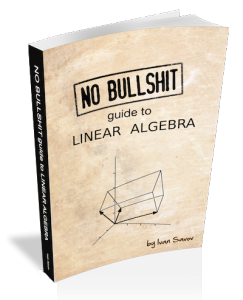I’m happy to announce the No Bullshit Guide to Linear Algebra v2.2 is out. This update contains two years’ worth of text improvements based on readers’ feedback.
In this blog post I’ll summarize the changes to the book and provide some more context about why these changes were needed. I’ve included links to PDF excerpts of all the new sections[1,2,3,4] and a detailed red-blue diff that shows all edits.
Continue reading “No Bullshit Guide to Linear Algebra v2.2 update”
